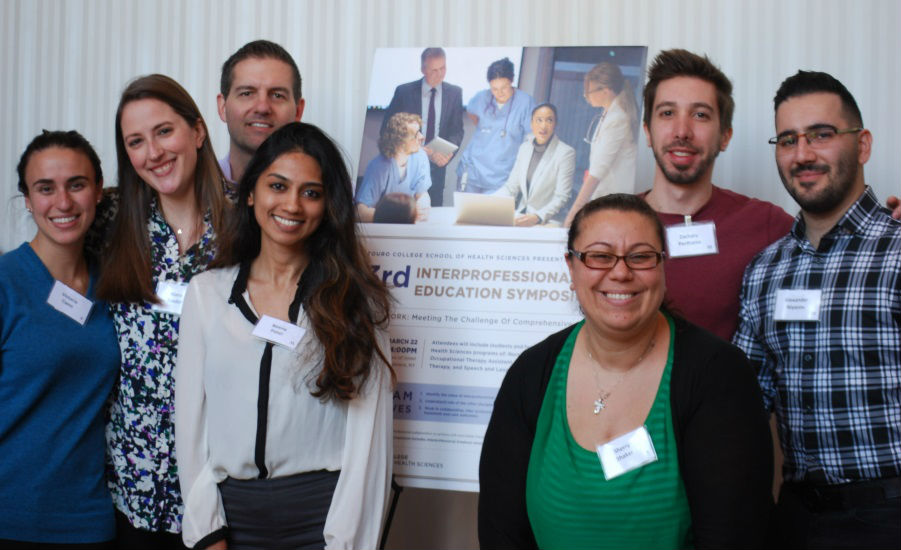The 2016 Interprofessional Education Symposium
Teamwork: Meeting the challenge of Comprehensive Care

At a recent Inter-Professional Education Symposium (IPE) sponsored by Touro College School of Health Sciences, over 350 students, faculty, and clinicians from the departments of Physical Therapy, Occupational Therapy, Nursing, Speech Language Pathology, and Physician Assistant gathered to work together as an interprofessional team to first treat and later plan for the discharge of a fictitious patient; a 23-year-old adult with autism spectrum disorder (ASD) admitted to the hospital after suffering multiple fractures from a car accident.
"Adults with autism are the forgotten patients,” said Dr. Steven Blaustein, Associate Professor of Speech and Language Pathology at Touro College School of Health Sciences (SHS) and a nationally recognized expert on ASD. “They have difficulty navigating a health care system that relies heavily on verbal communication.” Dr. Blaustein cited studies indicating that adults with ASD, who are “a growing population,” are more likely to live in poverty with less access to medical care. In a recent survey of healthcare professionals, the vast majority said they felt they were not adequately prepared to deal with individuals with autism and they required more training.
The Symposium −which each year spotlights the collaborative, interdisciplinary approach to delivering quality healthcare− had two breakout sessions where students sat at tables with at least one representative from each of the programs at the SHS: OT, OTA, PT, RN, and SLP and a faculty facilitator. The morning session revolved around treatment planning during the acute care phase. The afternoon session had a group working as an interprofessional team to discharge the patient to the most appropriate setting. This year’s fictitious patient case was especially challenging because the characteristics of ASD such as tactile hypersensitivity and communication deficits require additional considerations when planning the optimal treatment.
"As a healthcare professional, it is hard to care for a patient who can’t respond in a particular way to your intervention," said Dr. Alex Lopez, an Assistant Prof. of Occupational Therapy at SHS. "Treating autism is a multidisciplinary effort and the diagnostic process is also multidisciplinary. Often you will need a team of doctors, occupational therapists, speech language pathologists, physical therapists, physician assistants, and psychologists to provide a diagnosis."
The entire healthcare team was required to address the patient’s medical needs, rehabilitation needs, verbal deficits, texture aversions, and limited diet. "There is no one answer in this hypothetical case study," said Dr. Rivka Molinsky Co-Chair of the SHS Interprofessional Education Committee. “Just like in real life, it’s collaborative. This case draws from all of the specialties and situations that arise. It was designed to challenge the students to incorporate all of the various skill sets and expertise they have studied."
Prior to the group sessions, a man in his mid-20s with ASD named Michael, who works at Staples, presented a remarkably candid personal perspective on the challenges in his life, work, and social interactions with peers and professionals: "Sometimes I get stuck in my mind about the way I think a process should go, and this has gotten me into trouble,” he said, barely looking at his audience. "It is hard for me to understand new expectations, or ways in which schedules change. Sometimes others need to pitch in and speak with a manager to clarify for me what is happening."
Michael’s presentation underscored the importance of the healthcare community’s understanding of the role that collaborative, interprofessional teams play in treating the ASD segment of the population. Said Dr. Lopez, “With ASD patients, as with all patients, we have to recognize the complexity of care, to heal, to consult, and to advocate. We are here to make a difference in the lives of others.”
Jill Horbacewicz, PT, PhD, Co-Chair of the SHS Interprofessional Committee added, “The best part of the day is hearing the feedback from the students on how exciting it was to represent their profession on this interprofessional team and how greatly they value interprofessional communication after this experience.”

